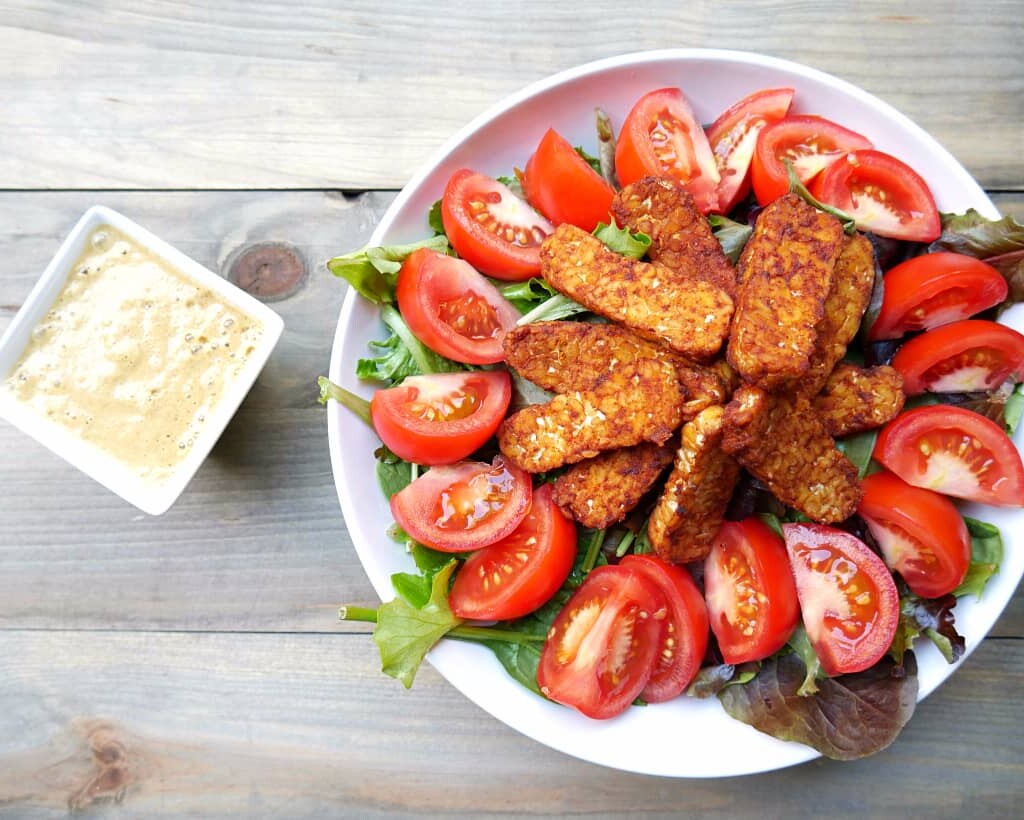Healthy vegan eating is a great way to get essential nutrients while caring for the environment. More and more people are looking for ways to make sure their meals are healthy and sustainable.
Healthy vegan cooking: a step-by-step guide to eating right
With the right ingredients, you can create delicious and nutritious dishes that will help you stay healthy and happy.
The key to a healthy vegan diet is to focus on whole plant foods. Avoid processed foods, such as white bread, chocolate bars and cookies.
Choose fresh vegetables, fruits, nuts, seeds, beans, legumes and cereals. All these foods provide a variety of vitamins and minerals essential for optimal health.
Food groups
When preparing meals with these ingredients, it can be helpful to think in terms of “food groups”: carbohydrates (grains), proteins (legumes and nuts), fats (oils and avocados) and vitamins and minerals (fruits and vegetables).
By combining different types of these food groups, you will get the most nutrient-rich food possible without relying on animal products or processed foods. There are plenty of delicious vegan recipes that are easy to prepare without spending hours in the kitchen.
- You can prepare stir-fries with tofu or tempeh as a source of protein, served over brown rice or quinoa;
- vegan tacos with lentils or beans as the main ingredient;
- hummus sandwiches with fresh vegetables;
- almond milk, banana and spinach smoothies;
- roasted sweet potatoes with avocado;
- homemade soups loaded with vegetables;
- bowls of roasted vegetables served over quinoa;
- salads made with a variety of fresh vegetables mixed with nuts/seeds;
- curries made with coconut milk and your favorite spices;
- homemade energy bars made with dates, nuts/seeds;
- no-bake cookie dough balls made with oatmeal and nut butter…
The list of possibilities is endless.
Maintaining a balanced vegan diet takes planning, but it doesn’t have to be hard work!
For starters, stock your kitchen with plenty of fresh produce: buy whatever you fancy at your local grocery store or farmer’s market each week so you’ll always have something nutritious on hand when you get hungry.
Above all, remember that eating healthy doesn’t have to be boring: be creative in the kitchen and enjoy every meal!
The best vegan recipes
Being vegan doesn’t have to be bland. With a little creativity and the right ingredients, you can create delicious and healthy vegan dishes that will satisfy even the pickiest eaters.
Here are some of the best vegan recipes you’re sure to love.
- Vegan chili: made with beans and flavorful spices like cumin, oregano and paprika. It’s easy to make and freezes well for easy meal planning. Serve it with vegan cornbread or over brown rice for a complete meal.
- Veggie burgers: packed with plant-based protein from black beans, quinoa and nuts. They have garlic, cumin and chili powder for extra flavor. Serve them in muffins with your favorite toppings or enjoy them as is for a delicious lunch or dinner that won’t leave you feeling deprived.
- Lentil Tacos: A good base for tacos is lentils, as they are rich in fiber and protein without being too heavy on the stomach. Dress the lentils with your favorite taco seasonings and fill the tacos with lettuce, tomato, jalapenos, onion and salsa, an easy weeknight dinner option that will please everyone!
- Buddha Bowls: this nutrient-packed dish combines grains like quinoa or brown rice with roasted vegetables like sweet potato or cauliflower, along with beans and veggies of your choice – plus some avocado slices – all topped with a tasty dressing like tahini or lemon vinaigrette for added flavor and texture!
- Eggplant Lasagna: Instead of ground beef or sausage, put sliced eggplant. Add marinara sauce, cashew sauce (instead of cottage cheese) and lots of veggies for a vegan lasagna recipe that everyone will love.
These are just a few ideas for delicious vegan dishes that everyone can enjoy: get creative in the kitchen today!
Vegan Lifestyle
While some argue that veganism is difficult to maintain due to the lack of options in restaurants and grocery stores, the truth is that it has never been easier to make the transition.
The goal of veganism is to avoid animal exploitation in all aspects of life.
This means abstaining from eating meat (including fish and seafood), dairy, eggs and other animal products such as honey and gelatin. They also avoid using products (such as clothing) made from animals or containing animal by-products such as leather and wool.
In addition, vegans seek cruelty-free alternatives, such as plant-based foods, cruelty-free cosmetics and household products, natural fibers for clothing, etc.
The process of abandoning animal products can be done gradually. Some people start by introducing meatless meals into their diet one day a week and then gradually increase them until they feel comfortable with an all-vegetable diet.
For example, others reduce the consumption of dairy products until they can eliminate them from their diet.
You can follow the same gradual approach when it comes to changing closet or household items to vegan alternatives, such as bamboo towels instead of cotton, faux fur instead of real leather, etc.
The vegan lifestyle has numerous advantages:
- is better for health because plant-based foods contain more nutrients than animal-based foods;
- it reduces the impact of climate change, as livestock production uses far more resources than plant-based agriculture;
- and finally, it helps to reduce animal suffering, because no animals have been harmed in the production of food or clothing.
Essentially, the transition to a vegan lifestyle can be made one step at a time, which makes it more feasible. Given the right information, resources and support, it is possible to make the change with ease.
Why not give it a try today? You never know what positive changes you may experience as a result.
Beginner’s Vegan Cooking
Making a vegan meal doesn’t have to be as daunting as it seems. With these simple tips and tricks, anyone can start cooking healthy and delicious vegan dishes.
- Start simple: think about mastering a few simple vegan recipes and go from there. Try some classic dishes first, like pasta with marinara sauce or a bean burrito with guacamole.
- Stick to the basics: it’s best to create dishes with whole-grain staples, such as fruits and vegetables, legumes and grains, nuts and seeds and plant-based proteins like tofu or tempeh. This way, you’ll give your dish an added nutritional boost while keeping it simple.
- Explore different flavors: You don’t have to give up all your favorite flavors. Experiment with spices, herbs and other seasonings to create flavorful dishes. For example, add a little garlic or cilantro for Mexican-inspired dishes or turmeric for an Indian-style meal.
- Stock up on staples: stock your pantry with canned beans, rice, quinoa, nuts, nut butter and canned tomatoes so you always have something on hand when you need it. This way, meal planning will be much easier, since you won’t have to run out to the store every time you want to cook something new.
- Be creative: Don’t be afraid to be creative in the kitchen. Try to find new combinations of ingredients that you can use in different recipes so that you can constantly try something new without having to spend too much time shopping for groceries every week.
We can all start preparing delicious vegan dishes in no time by following these tips and tricks. If you practice a little and get creative in the kitchen, you’ll become an expert vegan cook in no time.
What do some doctors have to say about veganism?
With the emergence of veganism and plant-based diets, many people are wondering what the medical community has to say about this lifestyle choice.
In general, doctors feel that veganism can be a healthy choice for people who want to improve their health, as long as it is done correctly.
For starters, vegan diets contain no animal products, so they are low in cholesterol and saturated fats. Therefore, vegans tend to have a lower risk of heart disease and certain types of cancer.
Vegan diets also tend to be higher in fiber, which can help reduce risk factors for diabetes and obesity.
Other research indicates that vegans may experience greater mental clarity and a stronger immune system thanks to the presence of antioxidants in fruits, vegetables, nuts and seeds.
However, there are some caveats to keep in mind when considering going vegan.
There are many nutrient deficiencies associated with vegan diets, such as deficiency of vitamin B12, which is found naturally in animal products such as meat and dairy products.
Vegans should take special care to supplement their diets with adequate amounts of vitamins B12 and D, as well as calcium, to avoid deficiencies.
Studies also suggest that vegan consumers may need more protein than non-vegans due to the limited sources available in a plant-based diet.
To ensure that you are getting enough protein, you should regularly include protein-rich foods such as tofu, tempeh, or nut butter made from almonds or cashews in your meal plan.
Overall, if planned properly and supplemented where necessary, veganism can be an effective way to lead a healthier lifestyle or lose weight, with potential benefits such as lowering cholesterol levels and improving digestive health.
However, before embarking on any dietary change, it is best to first consult with your doctor, who will help ensure that your new lifestyle is providing you with all the nutrients you need.





